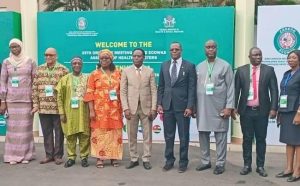The Director-General of West African Health Organisation (WAHO), Dr Melchior Aissi, has called on ECOWAS member states to intensify efforts to achieve the Sustainable Development Goals (SDGs) before the 2030 deadline.

Aissi made the call on Tuesday, May 14, 2024, in Abuja, at the opening of the Health Experts Committee Meeting of the 25th Assembly of Health Ministers (AHM) of Economic Community of West African States (ECOWAS) Conference.
The conference was organised by the West African Health Organisation (WAHO), a specialised institution of ECOWAS responsible for health issues.
The conference has “The Quality of Health Care in the ECOWAS Region, Determinants and Prospects” as its theme.
According to Joel, due to the 2030 deadline, pressure is mounting on all States in general and those of the ECOWAS region in particular to achieve the goals.
“This is in view of the progress made and the effective evidence of mechanisms and approaches capable of strengthening and amplifying the effects of our actions in the hope of achieving the expected results in the long term.
“The theme chosen for this 25th AHM is perfectly in line with the elements of analysis of this objective and is in good continuity with the theme of the 24th AHM.
“Indeed, in order to achieve the required quality in the provision of care, quality human resources for health must be available, apply and respect the norms and standards of quality established for care in all its forms.”
Aissi also tasked the experts to carry out a critical analysis accompanied by concrete solutions to comply with the World Health Organisation (WHO) recommendation on breastfeeding up to the age of six months, which is one of the most effective ways of preserving health and ensuring child survival.
The Chairman of the health experts committee, Dr Chris Isokpunwu, said that the gathering was not only for them to represent their nations, but for them to serve as stewards of health and well-being for the people.
Isokpunwu, who is the Director, Health Planning, Research and Statistics at the Ministry of Health and Social Welfare, said that Nigeria, as one of the largest and most populous countries in the region, offers unique perspectives and challenges.
According to him, with a diverse landscape and a significant portion of the population residing in rural areas, it faces the ongoing task of ensuring equitable access to quality healthcare services across all communities.
He, however, said that the nation’s commitment to health was unwavering.
“This is evident in our National Health Sector Renewal Investment Initiative, which is designed to reduce physical and financial pains, and produce health for all Nigerians.
“National Health Insurance Scheme is being reorganised, aimed at expanding coverage and reducing out-of- pocket expenses for healthcare.
“However, we recognise that there is still much work to be done, particularly in addressing persistent issues such as maternal and child health, infectious diseases, and the emerging threat of non-communicable diseases.”
Isokpunwu urged the gathering to discuss strategies and forge partnerships that would reaffirm their dedication to the health and well-being of every individual in the region.
He said: “Together, through collaboration, innovation, and shared resources, we can overcome challenges, strengthen health systems, and build a brighter, healthier future for all West Africans.”
The ECOWAS Assembly of Ministers of Health (AMS) is a statutory body of ECOWAS where health authorities assess the health situation in the region and take harmonised decisions on current health issues.
It also makes recommendations to Member States on all matters of interest to the health of the community and beyond.
The meeting which is expected to bring together the Ministers of Health of ECOWAS Member States, Health Experts and Stakeholders began on Monday and will end on Friday.
By Folasade Akpan
